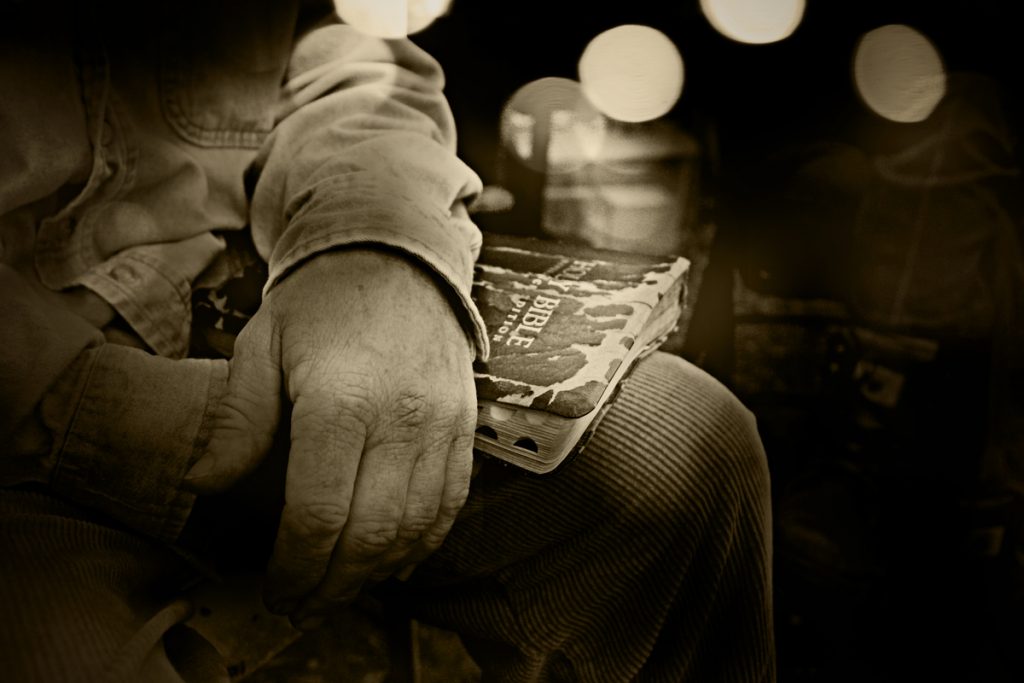by Bill Carroll
“There was a rich man who was dressed in purple and fine linen and who feasted sumptuously every day. And at his gate lay a poor man named Lazarus, covered with sores, who longed to satisfy his hunger with what fell from the rich man’s table; even the dogs would come and lick his sores. The poor man died and was carried away by the angels to be with Abraham. The rich man also died and was buried. In Hades, where he was being tormented, he looked up and saw Abraham far away with Lazarus by his side. He called out, ‘Father Abraham, have mercy on me, and send Lazarus to dip the tip of his finger in water and cool my tongue; for I am in agony in these flames.’ But Abraham said, ‘Child, remember that during your lifetime you received your good things, and Lazarus in like manner evil things; but now he is comforted here, and you are in agony. Besides all this, between you and us a great chasm has been fixed, so that those who might want to pass from here to you cannot do so, and no one can cross from there to us.’ He said, ‘Then, father, I beg you to send him to my father’s house— for I have five brothers—that he may warn them, so that they will not also come into this place of torment.’ Abraham replied, ‘They have Moses and the prophets; they should listen to them.’ He said, ‘No, father Abraham; but if someone goes to them from the dead, they will repent.’ He said to him, ‘If they do not listen to Moses and the prophets, neither will they be convinced even if someone rises from the dead.’” (Luke 16:19-31)
At a Bible study a few years ago, the leader asked us a question about this Gospel lesson: Just who do we think we are in the story? Some said “poor Lazarus.” Others “the rich man.” And I suppose a case could be made for either, depending on who we are. But I think the leader made a better point: “We are one of the rich man’s five brothers.”
Jesus tells this story for those who still have time to repent. He tells it for those of us who still have time to change our minds. He tells it to urge us respond to the cries of “the least of these, who are members of my family” (Matthew 25:40).
Generational, backbreaking poverty is a reality for many people in most of the places I have served as a priest. In the town where I live today, some of our neighbors are addicted or mentally ill. Others are unemployed, homeless, or hungry. Still others have criminal records. I live in Oklahoma, the state with the highest per capita rate of imprisonment for women and the second highest overall. These sisters and brothers have records that follow them around, preventing them finding stable employment or reentering society.
If we have eyes to see, we can also find poor Lazarus in the millions who come to this country (as many of our own families did) seeking safer and more prosperous lives. Many are facing violence and persecution. Others are having trouble providing for their families. These brothers and sisters are also poor Lazarus, lying at the gates. We all have a fundamental choice about whether to see them, befriend them, and join with them in solidarity—or to turn our faces away in shame and misplaced anger.
I don’t have much to say by way of specific policy proposals. That’s a debate to which we all need to contribute, and where reasonable people disagree. Like any matter of public policy, we need to do our homework and try to understand the implications of the policies we pursue. As Christians, we also need to be especially concerned for how they will affect the most vulnerable among us.
One thing is certain: We can do better. Whatever we decide about immigration laws and policies, we need to respond to our sisters and brothers in need. Above all, we need to act swiftly to protect vulnerable children and honor our moral and legal obligations to those seeking asylum. And then, we need to work through our disagreements and cooperate with all people of good will, regardless of party or perspective, to fix a broken system.
We need to do it NOW, while there is still time to repent.
The Rev. Canon Bill Carroll serves as Canon for Clergy Transitions and Congregational Life in the Diocese of Oklahoma. He has served as a parish priest in Oklahoma, as a parish priest and college chaplain in Southern Ohio, and as a member of a seminary faculty. In 2005, he earned his Ph.D. in Christian theology from the University of Chicago Divinity School.
image from lightstock.com

